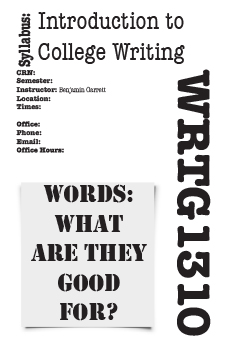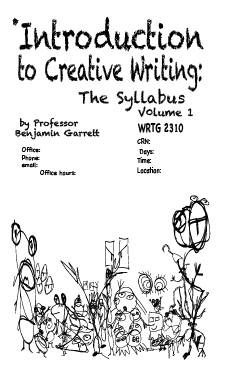
college writing syllabus cover
Writing 1310 : Introduction to College Writing
University of Central Arkansas
Fall 2015, Spring 2016
Delivery: Face to face.
Sections 4
University course description:
Writing 1310 is part of UCA’s lower division core and is required
of all students during the first semester they are eligible to enroll.
This course introduces students to the writing process, focusing on
audience, invention, and arrangement, and will be conducted as
a workshop.
My supplemental course description:
Everyone of us have our own stories about how we came to this
classroom: Stories about reading, writing, how we have learned to
record and document our ideas and how we have shared them with
others. This class will be about exploring these stories. Not just our own,
but the stories of those who have come before us, and the stories that
shaped them into the readers and writers that we have come to respect.
I have heard rumors that Writing 1310 is the course that is supposed
to teach you every skill you need to be a great college writer; so that
you can experience success across the academy and beyond into the
post-college universe. BUT DO NOT BE FOOLED! As a teacher, I am a
charlatan, a con artist. My handwriting is nearly illegible and my spelling
and grammaring are suspect at best. By myself, I can teach you nothing
that you do not already know. Whether this classroom becomes the
center of learning, exploration and critical thinking that I believe it will,
has far less to do with me as an “instructor” than it does with you all
as students. Together, through reading, listening, writing, discussing,
watching and even computing, we all are going to help each other
identify and develop the tactics that will take us, through writing, to
places beyond all of our current expectations.

creative writing syllabus cover
WRTG 2310 : Introduction to Creative Writing
University of Central Arkansas
Fall 2016, Spring 2017
Delivery: Face to face.
Sections: 4
University course description:
This course introduces students to several core components of
successful creative expression and allows students to practice them
through composing original, imaginative work in poetry, prose, and
other genres depending on the instructor’s expertise. Class time will
be devoted to workshops, invention exercises, and the discussion
of guided reading assignments. The course is required for both
creative writing and writing majors and minors. Lecture, discussion.
Prerequisite: WRTG 1310. Fall, spring, summer, on demand.
My supplemental course description:
I believe that words have power. Sometimes magical, oftentimes super, the exact power of words is often illusive until they are spoken, written or otherwise shared. This class is about exploring the power(s) of our words when we apply to them the full potential of our imaginations. We will investigate the forms and genres of writing that have previously defined and inspired the field of creative writing, as well as experiment with the ways those forms and genres are being challenged by writers today. We will investigate the forms and genres of writing that have previously defined and inspired the field of creative writing, as well as experiment with the ways those forms and genres are being challenged by writers today. We will practice our writing processes, and process our writing practices. We will write daily and share our writing often. We will read examples of creative writing that demonstrate the power of language and discuss the techniques and methods utilized by the authors of those texts. We will work together to create a literary classroom environment that supports each of us on our journey to discover the capacity of ourselves as creative writers.
ENG 121 : Composition I
Lansing Community College
Fall 2018 to Present
Delivery: Face to face, Online Real Time, Asynchronous, and hybrid.
Sections 17
Community College course description:
Composition I is the study and practice of expository discourse to help students write more effectively. It emphasizes critical thinking, academic source materials, writing processes, content development, structure, style, database research, and documentation.
My supplemental course description:
Every one of us have our own stories about how we came to this classroom: Stories about reading, writing, how we have learned to record and document our ideas and how we have shared them with others. This class is not just about exploring these stories, but looking ahead to how you want yours to grow. To accomplish this, we, as a class, will be looking at what writing has been taught to us, what types of writing have been prioritized, and how that has both helped and hindered the growth of our own writing processes and literacies. I have heard rumors that ENG 121 is the course that is supposed to teach you every skill you need to be a great college writer, so that you can experience success across the academy and beyond into the post-college universe. BUT DO NOT BE FOOLED! As a teacher, I am a charlatan, a con artist. My handwriting can nearly illegible and my SPelling and grammaring are suspect at best. By myself, I can teach you nothing that you do not already know. Whether this classroom becomes the center of learning, exploration and critical thinking that I believe it will, has no more to do with my skillz as an “instructor” than it does with your desire to be a student. That means that we are going to have to work together; through reading, listening, writing, discussing, watching and even computing, we all are going to help each other identify and develop the tactics that will take us, through writing, to places beyond all of our current expectations.
ENG 122 : Composition II
Lansing Community College
Spring 2018 to Present
Delivery: Face to face, Online Real Time, Asynchronous, and hybrid.
Sections 5
Community Colle
e course description:
This course builds upon the writing skills developed in ENGL 121 to help students write argumentative essays which use logical support and appropriate documentation. The course develops analytical skills in reading, writing, and research techniques. Students learn about the development, structure, and style of academic research.
My supplemental course description:
Composition part 2: The final frontier of college writing? Or only the beginning of a long career in writing? Sequels are always a challenge to make. Everyone has high expectations for how the sequel is going to take the material from the original and raise it to a higher level. Oftentimes, audiences are torn between just wanting more of what they got the first time, but also expecting new and exciting material that will push the story forward in an unexpected direction. But a college classroom is not the same thing as a Hollywood Blockbuster.
In a college classroom, the cast of characters is going to change from season to season, with only maybe one or two recurring characters alongside you, this story’s protagonist. Maybe you are taking this class with a friend, or a fellow classmate you have studied with previously, and maybe not. Maybe you have had this Con-artist posing as an instructor previously, or maybe you haven’t. Maybe you are growing accustom to taking classes online, or maybe this is a first. Regardless of your past experiences with the college writing classroom, or the online college classroom, and the people you are going to be sharing it with over the next 16-ish short weeks, you are coming here with expectations, for yourself, for your fellow classmates, for your teacher, and for what you are going to accomplish in your time within this learning space.
Unstated, those expectations have a high probability of sitting, stagnating and potentially even festering into frustration and disappoint, as I, your instructor, am very likely not a mindreader, and am not going to be able to predict what your goals are for your time in this class and what you hope to get out of it. So before any of us can figure out what we are going to accomplish this semester, we all probably need to get our expectations out of our heads, and into a form of media that is comprehensible by us who lack the psychic abilities to read minds. Let’s go ahead and make this the very first assignment of the class.



